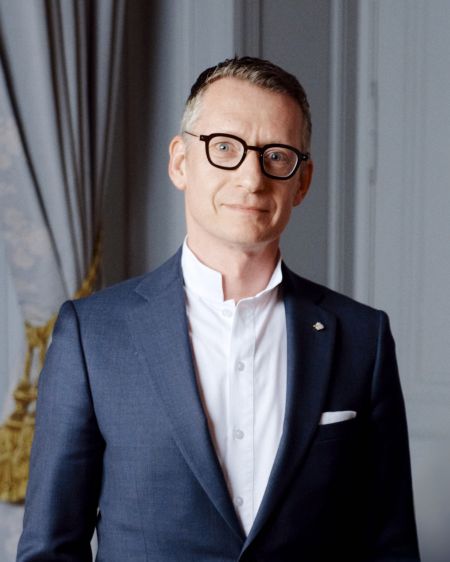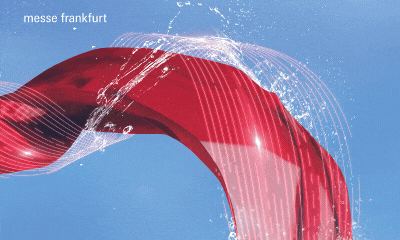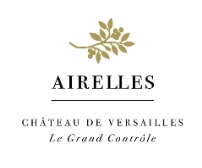Catégorie : Europe - France - Économie du secteur
- Interviews et portraits
- Rénovation ou nouveauté dans un établissement - Interviews - Les Leaders du secteur
Interview de Romane Le Royer le lundi 29 septembre 2025
 Julien Révah, General Manager of Airelles Château de Versailles, Le Grand Contrôle
Crédit photo © Thomas Chéné / Airelles Château de Versailles, Le Grand Contrôle Julien Révah began his career studying science and medicine before switching to the hotel industry, convinced that people should remain at the heart of his profession. To gain experience quickly, he undertook a BTS apprenticeship, which allowed him to discover how luxury hotels operate in practice and develop his first operational skills. His early career included experiences at the Prince de Galles and the Renaissance Paris La Défense, where he explored all aspects of the hotel business, from front desk to housekeeping, accounting and sales, thereby strengthening his overall understanding of the sector.
Armed with this experience, he joined the Marriott group in the United States in 2000, where he trained in international standards and the management of multicultural teams in demanding environments. Back in France, he took on a series of assignments in various Parisian hotels and participated in several openings, holding operational management positions at the Walt and Marquis hotels from 2005 to 2008. These experiences allowed him to refine his vision of luxury hospitality, focused on quality of service and customer experience.
In December 2009, he became General Manager of the L'Hôtel, where he supervised a team of almost 40 people and oversaw all operations, from the bar to the gourmet restaurant. For more than nine years, he consolidated his management and service philosophy, combining high standards, creativity and close working relationships with his teams.
In April 2019, he joined Le Grand Contrôle, part of the Airelles collection in Versailles, as General Manager. He orchestrated the creation of a unique hotel within the historic grounds of the Palace of Versailles, devising an immersive experience where heritage, gastronomy and bespoke service come together with refinement. Under his leadership, Le Grand Contrôle became a benchmark for luxury hotels in France, combining innovation, operational rigour and constant attention to staff and guests.
Le Journal des Palaces met with Julien Révah to discuss his unusual career path, his experiences in Paris and abroad, and his vision of management and innovation that now shapes Le Grand Contrôle.
Journal des Palaces: You arrived in 2019, two years before the opening. Had the hotel's broad outlines already been decided?
Julien Révah: No. And that's what made this adventure so extraordinary: the opportunity to imagine and build everything from scratch. Together with my teams and the general management at the time, we designed the entire project. We knew we would have a remarkable hotel, a real gem, and we chose to develop experiences linked to the 18th century. It wasn't an obligation, but a strong desire. The château doesn't impose anything on us. However, we wanted to offer a total immersion and see this approach through to the end.
In the hotel industry, many experiences are appealing in concept, but they don't follow through on the story. We took the opposite approach, driven by the energy of our owner: to give complete coherence to every detail.
These years of work and preparation have been exciting. They have allowed us to develop experiences, forge a partnership and build a solid relationship with the Palace of Versailles. When I took up my position in 2019, it was not possible to access the palace outside of normal opening hours. We had to make this experience possible. Gradually, we succeeded. The challenge was met.
What conclusions do you draw from four years of opening and more than six years at the head of the hotel? How do you analyse this period?
I consider it a great success. We were able to correctly analyse the place in which we were operating. Located in a public domain, we had to proceed with caution, without ostentation. This approach enabled us to build an exceptional relationship with the Palace of Versailles and to anchor our project firmly in its environment.
Today, everyone knows that there is a hotel within the grounds of the Palace of Versailles, which seemed unimaginable in 2019. At the time, many thought that the heritage site would be bought up by foreign funds. So we had to reassure people and explain that we were there to welcome the public, especially the residents of Versailles, who are very attached to their palace.
The result is also an unprecedented emotion among our guests. I never imagined how much this place, its location and the commitment of our teams would touch people.
Some guests are deeply moved when they realise they are staying in the Palace of Versailles. For Americans in particular, the place is extremely powerful, fuelled by the imagination of films and mythical scenes. They seek to relive this world through the experiences we offer, such as the masked balls on 31 December or the major events organised by the palace.
I was surprised by the enthusiasm for this classicism and the way it had to be integrated into the 21st century. The question of uniforms is one example: we didn't want to create an anachronism with contemporary outfits. So we opted for classic costumes, in keeping with the 18th-century décor. These costumes help the teams get into their roles, just like in the theatre. The parallel with Molière and the development of the arts at Versailles inspired me greatly, and we regularly use theatrical techniques in team training.
How would you define the experience you offer your customers?
I don't like to talk about ‘hotel services’. At Airelles, we don't consider our establishments to be hotels, but rather homes. Homes with a capital H: places where we welcome guests with generosity and warmth, as if we were welcoming them into our own homes.
Our guests return regularly, some twice a year since we opened. They know that here they will find an extraordinary place and sincere, never ostentatious service.
We have 13 keys and more than 130 employees. This unprecedented ratio corresponds precisely to the expectations of our clientele: to prioritise the experience rather than simply providing hotel services. We hold regular meetings to invent and renew experiences. It is a real collective dynamic that motivates both our teams and our guests.
Since opening in 2021, have you made any changes, particularly after the first year, because things could work better differently?
The biggest change concerns the restaurant. We are co-owners with Alain Ducasse, who is very involved and designs all the menus, from breakfast to dinner. We have created a dinner that we call the ‘Festin Royal’ (Royal Feast): a unique menu that reinterprets the great classics of 18th-century gastronomy. The idea was to recreate the atmosphere of a royal dinner at Versailles, but with contemporary cuisine.
Very quickly, we wanted to make this experience even more immersive. So we enhanced it with a real scenography: the welcome is ritualised, the guests dine at the same pace and enjoy a refined setting.
This balance between a unique experience and a dinner that remains gastronomic is delicate to achieve, but we manage it. The Royal Feast evolves four times a year to accompany the change of menu. We sometimes combine it with grand tables, musicians or spectacular floral decorations.
Beyond catering, we are constantly seeking to offer unique experiences. Customers no longer want to queue or settle for classic hotel comfort: they want exclusive access to venues or events.
For example, we are welcoming more and more families on medium-length stays. We have developed activities to suit: an introduction to falconry, sword fighting with a costumed fencing master, horse riding in the grounds of Versailles. We have also designed experiences for children and even unusual moments such as ‘tea with Marie-Antoinette’.
Costumes are also part of these offerings. We rent high-quality outfits used in film productions, with a wigmaker and make-up artist to transform our customers into real historical figures. Some customers want to live the experience to the fullest and take the idea to its logical conclusion.
How do you strike a balance between the historical experience you offer and the needs of a modern clientele, who want both total immersion and contemporary comforts?
Our clientele is demanding. They expect both excellent service and impeccable comfort. Le Grand Contrôle is a luxury hotel: everything is designed to ensure this. The building is air-conditioned and every detail has been carefully considered, but we have chosen not to install televisions in the rooms, for example. If a guest requests one, we can of course install it very easily. However, since we opened, this has only happened about ten times. Our guests fully understand this approach.
The most important thing is that our guests experience an authentic, historic setting. After visiting the château, when they return to their rooms, they really feel like they are sleeping in Versailles. Comfort is certainly present, but it serves to enhance a unique experience that our guests fully embrace. They trust us, let themselves be guided, and seek precisely this break from their everyday lives.
Above all, they are looking for a moment of relaxation, almost philosophical, a break where they can refocus on themselves. In this spirit, no one complains about the absence of television or newspapers. On the contrary, letting go is now an integral part of the experience, and that is exactly what we offer them.
Does this idea of ‘letting go’ also allow guests to disconnect from an external context that can sometimes be difficult?
Yes, absolutely. Our stays are not medical stays or therapies, but they offer a privileged setting where guests can disconnect. Historically, Versailles served this purpose: Louis XIV, who grew up in the Louvre, chose to settle in Versailles for his safety and for its proximity to nature.
In practice, this letting go also translates into discovering Versailles itself. Many guests spend a day in Paris beforehand and only get to see part of the palace or gardens. When they stay with us for two days, they get to fully discover the palace and the town. They then realise that Versailles is a destination in itself, just thirty minutes from Paris, and no longer just a day trip from the capital.
What do you consider to be the major successes of the last four years? What achievements make you particularly proud?
The greatest success has been helping to define what a unique hotel experience is today. Convincing our employees to follow us in this vision has been a real success.
The team has 130 employees and staff turnover remains low. When recruiting, the main criterion is interpersonal skills, because technical skills can be acquired on the job, in the very specific context of our company. I am also proud of the emulation that exists: it is now the employees who come up with ideas for improving the experience. Even though I meet with all my clients, it is the team that is in daily contact with them and initiates any adjustments.
Furthermore, for Airelles, it was a bold gamble. Transforming a public building into a luxury hotel required vision and organisation. There is only one other hotel of this type in the world, Le Grand Contrôle in Versailles, and it is a success we can be proud of.
Do you have staff specifically dedicated to creating the customer experience?
Yes. At Le Grand Contrôle, we have organised the service differently. We have a team dedicated to the customer experience, made up of butlers, supervised by a customer experience manager. The receptionists focus mainly on the administrative aspects of check-in and check-out.
Every member of the team can suggest ideas. For example, the ‘king's wake-up call’ recreates the right to knock on the door of Louis XV's apartments: the butler knocks gently on the door, prepares the bath, perfumes the room, brings a drink to bed, opens the curtains and plays classical music with a lantern. The teams then discuss details, such as adding rose petals or touches inspired by Marie Antoinette. This ensures that the experience remains historically accurate and immersive for guests.
Are there any developments or important dates coming up for the hotel, whether in terms of construction, renovations or new experiences?
Le Grand Contrôle is about to enter a new phase, with work already underway. At the end of 2025, our guests will be able to enjoy an adjacent building where a second restaurant will be created, open in the evening to both hotel guests and the general public. This restaurant will offer simpler château cuisine, focused on sharing, and will be run by the teams from Le Grand Contrôle and Ducasse.
We are also creating a three-bedroom duplex suite that can accommodate up to eight people, with spectacular views of the Jardin de l'Orangerie and the Cent Marches. This offering will be marketed as a private pavilion under the name ‘Pavillon des Jardiniers’. The opening is also scheduled for the end of the year.
How would you describe your management style and your approach to working with your teams and customers in a hotel with 130 employees such as Le Grand Contrôle, while balancing the expectations of customers and shareholders?
I consider myself very demanding, first with myself, then with my teams, but always in a fair and caring manner. There is no autocracy: I like to let ideas be expressed. When an employee proposes an initiative to enhance the customer experience, we discuss it and, if it is relevant, we implement it.
The small size of the hotel allows for a more direct relationship with customers. With 13 rooms and a maximum of around 40 customers, it is possible to be very present. Regardless of the establishment, a general manager must remain close to guests and employees.
The hotel functions like a three-legged stool: guests, employees and shareholders. Each of these three pillars must be balanced. If employees lack motivation, if guests are dissatisfied or if shareholders are unhappy, the whole thing collapses. The priority remains to ensure a balance between these three players.
A hotel like the Grand Contrôle also represents a guarantee: if this establishment works, it serves as a reference for other openings.
Do you have any mentors who inspired you at the beginning of your career or who continue to inspire you today, either as a manager or as a person?
Not directly. I have regretted a little never having had a mentor or been someone's deputy or number two. Ultimately, it is my encounters with owners, directors and my colleagues that have helped me develop and grow.
I observe a lot and I also learn a great deal from my teams. I'm almost 50, while the average age at Le Grand Contrôle is around 25. I also learn a lot from the support teams at headquarters. It's this diversity of perspectives and experiences that constantly nourishes me. I don't have a single role model to follow.
What advice would you give to a young person who wants to pursue a career in the luxury hotel industry?
The first piece of advice would be to consider this profession as the best in the world. You have to be brave and, above all, stay true to yourself. The hotel industry offers a multitude of different professions, which is wonderful.
Just because you start in a particular position doesn't mean you'll stay there for your entire career. I have employees here who come from a wide variety of backgrounds: a gardener from the Palace of Versailles joined Alain Ducasse's team because he wanted to move into cooking. Valets have become butlers, interns are now executive assistants, and waiters have become operations managers.
Don't worry if you don't know exactly what you want to do right from the start. The experience you gain through internships and your first jobs will help you gradually move towards your ambitions.
You don't become a hotel manager immediately after completing a BTS: it's a job that requires experience. You start at the bottom and work your way up the ladder over time. I myself started at the age of 16 at the Hôtel de Meurice as a bellboy, which was my first contact with the hotel industry.
|






